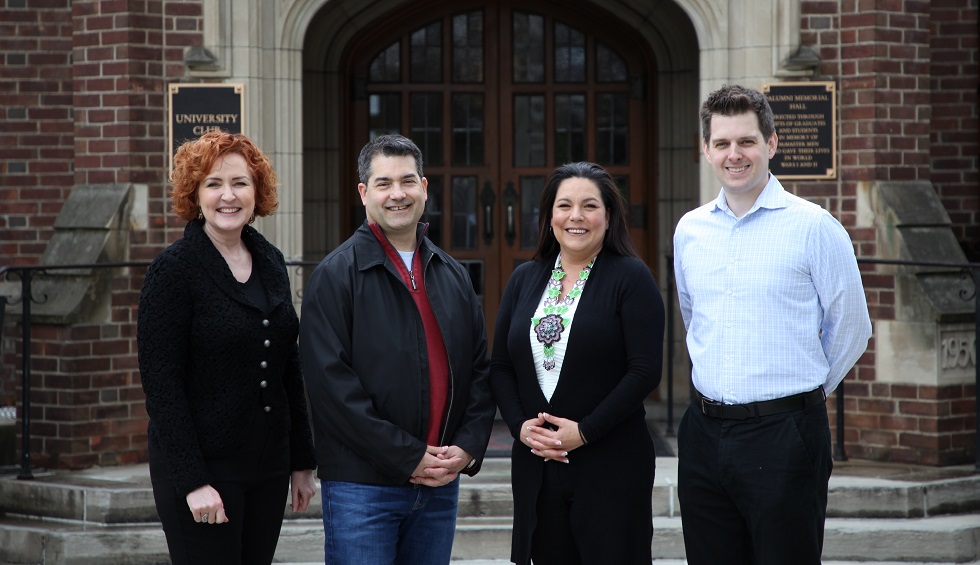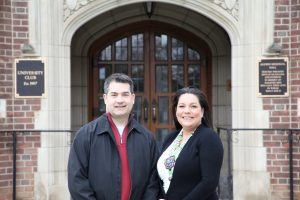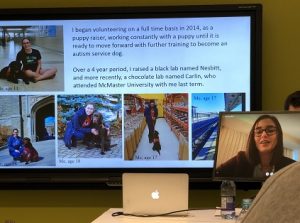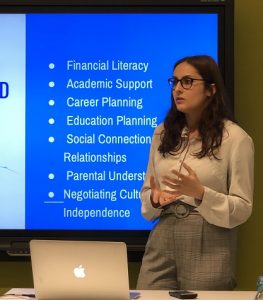Social Sciences students recognized for their advocacy work

Cynthia Denise McQueen (centre right) has won first place in the competition for the 2019 Clarke Prizes in Advocacy and Active Citizenship. Left to right: Tracy Prowse, associate dean academic, Faculty of Social Sciences; Ryan Clarke ’88, ’89; and Mark Busser, academic and experiential learning coordinator, Faculty of Social Sciences. Photo by John Kim.
Three McMaster students are the 2019 recipients of the Clarke Prizes in Advocacy and Active Citizenship. Funded by Mac grad Ryan Clarke and his wife, Leanne, the prizes are awarded to Social Sciences undergraduates with a vision for an advocacy campaign that brings about social or political change.
This year’s winners have received a boost for their projects that aim to improve Indigenous health care, increase service dog accessibility, and enhance access to post-secondary education for first-generation students.

Cynthia Denise McQueen was awarded the first-place prize of $3,000 for her work adapting medical terminology for Mohawk language speakers.
Before enrolling in McMaster’s Indigenous Studies Program, McQueen (whose traditional name is Kahontiyoha) graduated with a degree in Indigenous languages from Six Nations Polytechnic. She then built a career in health care.
Her goal is to apply to medical school — and share her knowledge and expertise with her family and community in the Mohawk language.
“I wanted to speak about my profession without having to resort to English,” said McQueen in her presentation to the jury. “I quickly found out this is not possible, because we do not have the vocabulary to talk about Western medical procedures.”
 Deanna Allain nabbed the second-place prize of $2,000. A first-year Social Sciences student, Allain has been an active advocate of service dog accessibility on campus and in Ontario.
Deanna Allain nabbed the second-place prize of $2,000. A first-year Social Sciences student, Allain has been an active advocate of service dog accessibility on campus and in Ontario.
She has urged policymakers and elected officials to improve policies and procedures, especially those that relate to the training of service dogs.
A service dog-in-training needs to be socialized in public spaces — but because their trainers don’t always have visible disabilities, they are often met with harassment and confusion, and can be denied access.
Allain will create a policy document for McMaster to recommend improvements to existing policies and procedures.
 Third place and $1,000 went to Linda Cabral, a fourth-year Social Psychology student.
Third place and $1,000 went to Linda Cabral, a fourth-year Social Psychology student.
Cabral has been developing a strategy for improving the resources available to first-generation students as they make the transition to university.
Research shows that first-generation students face disadvantages and challenges often compounded by other factors, such as racial marginalization, LGBTQ+ identity or low-income status.
Because their elders did not go to university, about one-third of post-secondary students often need to more actively seek out information, resources and supports.
Cabral is pushing for a suite of initiatives aimed at reversing these trends, by creating targeted resources and outreach programs — and by collaborating with on-campus partners and provincial entities such as OUAC, OSAP and the Ministry of Training, Colleges and Universities.
The winners were announced following an in-person advocacy event, during which shortlisted finalists were asked to demonstrate their advocacy skills, by delivering pitches on their chosen projects and then answering questions from the reviewing committee.
Committee members were: Sarah Adjekum, PhD candidate, Health Studies; Cristina Foley, Office of Experiential Education; Laura Ryan, Neighbour to Neighbour; and Sashaina Singh, Office of Community Engagement.
The Clarke Prize in Advocacy and Active Citizenship was funded in 2014 by Ryan and Leanne Clarke in order to reward students in the Faculty of Social Sciences for their advocacy work and support them in their development of key advocacy skillsets.
Ryan Clarke received a political science degree in 1988 and a master’s degree in 1989, both from Mac. He sees advocacy work as a crucial extension of an education in the social sciences.
“I really think this is a life skill,” says Clarke. “It’s critically important to be able to integrate advocacy in the context of your everyday life.”
“We’re very grateful to Ryan and Leanne for their generosity and foresight in setting up this unique prize,” says Tracy Prowse, associate dean academic in the Faculty of Social Sciences. “This initiative provides our students with a transformational experiential learning opportunity to pursue a meaningful project that they are passionate about.”
Read more about the Ryan and Leanne Clarke Prize in Advocacy and Active Citizenship.

